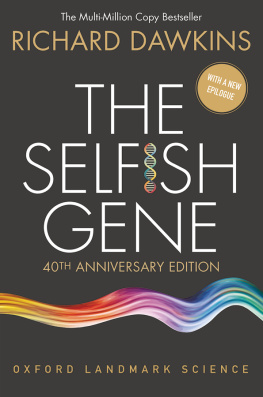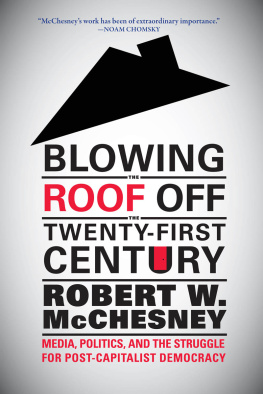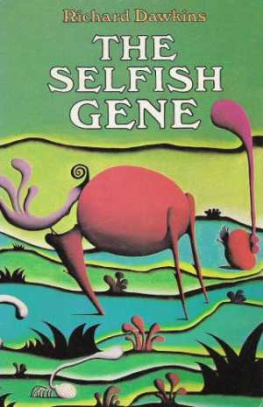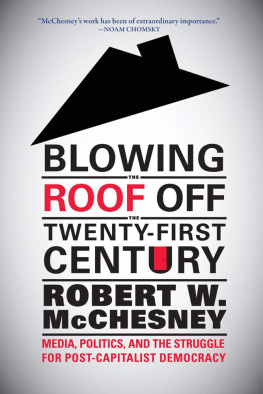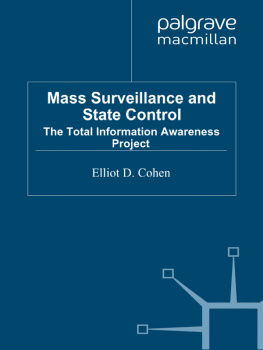Dawkins - Gene Wars
Here you can read online Dawkins - Gene Wars full text of the book (entire story) in english for free. Download pdf and epub, get meaning, cover and reviews about this ebook. year: 2011, publisher: Seven Stories Press, genre: Politics. Description of the work, (preface) as well as reviews are available. Best literature library LitArk.com created for fans of good reading and offers a wide selection of genres:
Romance novel
Science fiction
Adventure
Detective
Science
History
Home and family
Prose
Art
Politics
Computer
Non-fiction
Religion
Business
Children
Humor
Choose a favorite category and find really read worthwhile books. Enjoy immersion in the world of imagination, feel the emotions of the characters or learn something new for yourself, make an fascinating discovery.

Gene Wars: summary, description and annotation
We offer to read an annotation, description, summary or preface (depends on what the author of the book "Gene Wars" wrote himself). If you haven't found the necessary information about the book — write in the comments, we will try to find it.
Gene Wars — read online for free the complete book (whole text) full work
Below is the text of the book, divided by pages. System saving the place of the last page read, allows you to conveniently read the book "Gene Wars" online for free, without having to search again every time where you left off. Put a bookmark, and you can go to the page where you finished reading at any time.
Font size:
Interval:
Bookmark:
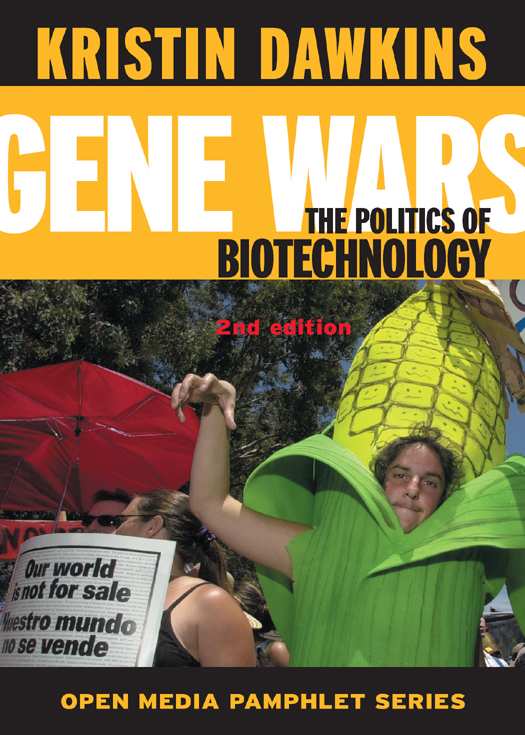
CORPORATE MEDIA AND THE THREAT TO DEMOCRACY
Robert W. McChesney
80 pages / $5.95 / ISBN: 1-888363-47-9
THE WTO: FIVE YEARS OF REASONS TO RESIST
CORPORATE GLOBALIZATION
Lori Wallach and Michelle Sforza
Introduction by Ralph Nader
80 pages / $5.95 / ISBN: 1-58322-035-6
THE CASE OF MUMIA ABU-JAMAL:
A LIFE IN THE BALANCE
Amnesty International
64 pages / $6.95 / ISBN: 1-58322-081-X
WEAPONS IN SPACE
Karl Grossman
80 pages / $6.95 / ISBN: 1-58322-044-5
10 REASONS TO ABOLISH THE IMF & WORLD BANK
Kevin Dahaner
104 pages / $6.95 / ISBN: 1-58322-464-5
TERRORISM: THEIRS AND OURS
Eqbal Ahmad
64 pages / $6.95 / ISBN: 1-58322-490-4
SECRET TRIALS AND EXECUTIONS
Barbara Olshansky
80 pages / $6.95 / ISBN: 1-58322-537-4
9-11
Noam Chomsky
128 pages / $8.95 / ISBN: 1-58322-489-0
TERRORISM AND WAR
Howard Zinn
160 pages / $9.95 / ISBN: 1-58322-493-9
BIN LADEN, ISLAM, AND AMERICAS NEW WAR ON TERRORISM
Asad AbuKhalil
112 pages / $8.95 / ISBN: 1-58322-492-0
TO ORDER ADDITIONAL SERIES TITLES CALL 1 (800) 596-7437
OR VISIT WWW.SEVENSTORIES.COM
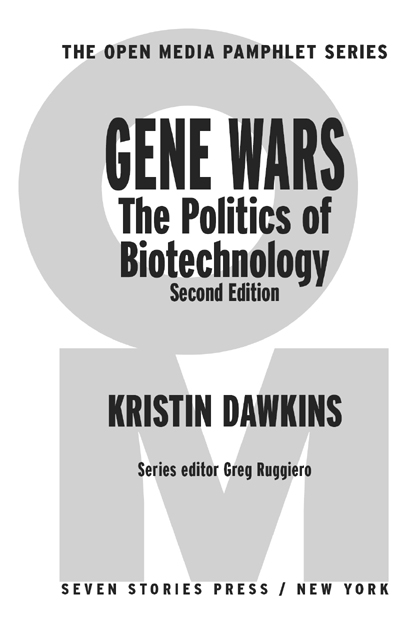
Copyright 2002 by Kristin Dawkins
A Seven Stories Press First Edition,
published in association with Open Media.
All rights reserved. No part of this book may be reproduced, stored in a retrieval system, or transmitted in any form, by any means, including mechanical, electric, photocopying, recording or otherwise, without the prior written permission of the publisher.
eISBN: 978-1-60980-357-5
Cover design by Greg Ruggiero.
Cover photo:
v3.1
Dedicated to
JOHN FLETCHER,
a family farmer in Georgia who works with the Federation of Southern Cooperatives/Land Assistance Fund
and
TODD LEAKE,
a family farmer in North Dakota who works with the Dakota Resource Council and the National Farmers Union
TO THE SECOND EDITION
Since the attacks of September 11, 2001, the specter of anthrax contamination spreading through the mails has greatly increased the feeling of insecurity visited on the United States. So far, indications suggest that the perpetrators of the anthrax attacks are also U.S. citizens, unlike the probable sponsors of the attacks on the World Trade Center towers and the Pentagon. But who will argue with the notion that both acts of terrorism are the result of deeply disgruntled persons angry enough to commit horrendous acts of violence that take innocent lives?
Ironically, the first edition of Gene Wars did not even mention biological weapons, despite the title. But well before September 11, my office at the Institute of Agriculture and Trade Policy noticed this ramification of biotechnology and we began to lobby in support of the 1972 Biological and Toxin Weapons treaty alongside so many other international treaties that merit understanding and active citizen campaigning.
The Biological and Toxin Weapons Convention (BTWC) bans the development, production and stockpiling of bacteriological and toxic agents intended for hostile purposes. So far, 144 countriesincluding the United Stateshave ratified the BTWC and talks were progressing on a Verification Protocol. But on July 25, 2001, President Bush pulled the U.S. out of the verification negotiations, suggesting that UN weapons inspectors might conduct industrial espionage. Then, in November, as public fears over anthrax grew, he suddenly announced a seven-point plan to strengthen the treaty, calling for national criminal laws against violators and for UN inspections of countries suspected of using biological weapons and places with suspicious disease outbreaks. But this latest plan still omits regular surprise international inspections of all bioweapons research facilities.
Nearly all the technology needed to develop offensive biological warfare can also be used for legitimate medical and biological research, and can even be conducted in the same laboratory. Modern breakthroughs in biotechnology have boosted the development of new dangerous and highly sophisticated biological weapons. And the United States is the primary political and financial force behind them.
Since 1998, the research and field testing of bioweapons has been conducted with U.S. encouragement and financial support through the United Nations Drug Control Program (UNDCP). An international campaign aimed at gaining support for this program persuaded the United Kingdom to provide for this biological war-on-drugs program.
Among the many contemporary developments, the use of bioweapons to kill illicit crops of coca, opium, and marijuana in Asia and South America has provoked controversy. These anti-crop weapons also affect wild plants and agriculture in fragile and diverse ecosystems, where the weapons can self-replicate indefinitely, as well as endanger human health. Illicit crop workers in Asia and Latin America are mostly poor peasants whose families live in drug-producing areas. Children play in narcotics-producing fields and are exposed to the agents, whether biological or chemical, used in the war against drugs. Thousands of people have been treated for chemical poisoning in drug-affected areas in Colombia where a U.S.-sponsored program fumigates illicit crops.
In November 2000, after tumultuous campaigning led by civic leaders from the Andean region with the support of concerned people worldwide, the UNDCP withdrew its support of plans to use biological agents against the coca shrub in Colombia and the Andean region. Nongovernmental organizations concerned with the proliferation of biological weapons welcomed the UN decision, warning, however, that anti-drug biological weapons programs were still active in Asia and the United States.
The Pentagon, for example, sponsors a Joint Non Lethal Weapons Program developing genetically engineered microbes to attack tanks, machinery and other equipment, as well as the use of microwaves, lasers, chemicals and biological derivatives to control peoplewhether they are attacking armies or civilian protestors. (Check out www.sunshineproject.org for more on this frightening stuff.)
Real justice is the only path to security and peace. It is my hope that this little book helps make that path more and more difficult to avoid.
Kristin Dawkins, with Chela Vazquez
Institute of Agriculture and Trade Policy
November 11, 2001
I myself have plenty to eat. In fact, I often eat too much and need to watch my diet. But millions of people in the United States are malnourished and some are even starving. Anyone who lives in a big city sees it regularly; in rural areas, it may not be as noticeable but its just as real. According to official U.S. statistics, one out of five Americans lives in poverty. Some 30 million Americans live with hunger12 million of them are children.
With the Welfare Reform Act of 1996, Congress cut from the federal budget $57 billion that was earmarked for the poor. Food stamp benefits were cut 20%from about 80 cents per meal to just 66 cents. By 1999, almost half of all food stamp recipients were kicked out of the program altogether. Federal aid to families with dependent childrenthe AFDC programwas eliminated, cutting off a major source of financial support to 13 million people, mostly children. With the cuts in just these two programsfood stamps and AFDCpoor families lost about $660 per month. And the reform set a five-year limit on continuing welfare eligibility, sounless something changesvirtually all of the United States poor people are now losing their federal lifeline to food, shelter and health care. How can the government of the richest country in the world get away with this monstrous welfare reform?
Font size:
Interval:
Bookmark:
Similar books «Gene Wars»
Look at similar books to Gene Wars. We have selected literature similar in name and meaning in the hope of providing readers with more options to find new, interesting, not yet read works.
Discussion, reviews of the book Gene Wars and just readers' own opinions. Leave your comments, write what you think about the work, its meaning or the main characters. Specify what exactly you liked and what you didn't like, and why you think so.






